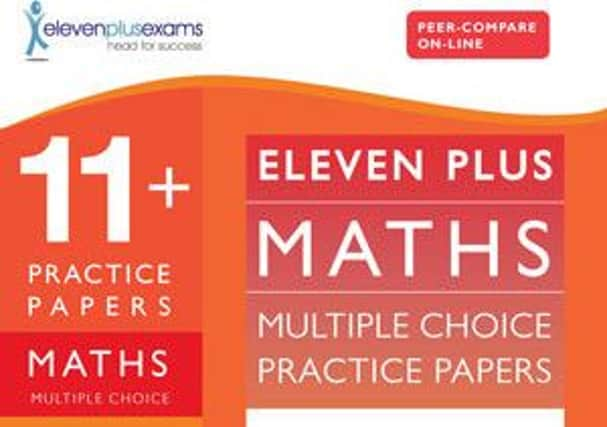Why failing a school test could be a blessing in disguise for your child


Others are clamouring for places in “good” schools after their offspring failed the educational test, while many more are happy with Milton Keynes’ non-selective system that renders the 11 plus unnecessary.
For any parents worrying about whether they have done the right thing, head teacher Jenny Clough has written a thought-provoking article specially for the Citizen about why failing the 11 plus could be a “blessing in disguise” for children.
Advertisement
Hide AdAdvertisement
Hide AdJenny, who is head of the independent Akeley Wood School, writes:
‘For many parents the failure of their son or daughter to pass the 11 plus exam can be traumatic. They suspect, even if their child does not, that it will be a setback that will severely limit life chances and blight future careers. They see the relief and satisfaction of friends and neighbours whose children have passed and imagine their effortless path to success. They may even feel that they have let their child down, that in some sense they have been found wanting as parents.
As a head teacher I can say with absolute certainty that their fears are totally misplaced. Over the years I have taught budding Einsteins and Hawkings as well as those who will always find school a challenge and I can say with conviction that failure is not assured at 11, nor for that matter is success.
Grammar schools – good though many are – are not for every child, even for every bright child. Yes, academic qualifications are important, yes children should be stretched. But not every child responds to a rigid curriculum, not every child can negotiate an exam obstacle course without the support or the confidence a broader education confers. There is not one, grammar school ordained route to academic success. Every child is different. An approach that works with one will not work for another.
Advertisement
Hide AdAdvertisement
Hide AdI can understand parents’ exasperation if they have had their child extensively coached or tutored only to see them fail the 11 plus. I can appreciate how frustrating it can be. But disappointed though they are I would offer one, perhaps surprising, observation: your child has almost certainly had a lucky escape. There is no more frightening and unforgiving place than the bottom set in a highly selective school. And if your child has always struggled academically yet managed to scrape a pass that is almost certainly where there would have ended up.
I have lost count of the number of children who have become desperately unhappy over the years as they tried to keep up with their higher-achieving peers. The sense of failure, of always having to compare oneself to a particular type of student, becomes corrosive. It can permanently scar a child’s sense of self.
What perhaps is less appreciated is that a hot-house environment does not necessarily suit even the brightest children. Every year my school sends many students to Oxbridge and Russell Group universities. They either did not pass the 11 plus or chose not to go to a grammar school because the environment wasn’t right for them.
Many bright children fail to blossom in a highly competitive school. They may lack confidence, or respond better academically when their creative, musical or sporting passions are nurtured, or they may simply prefer to study in a school that caters to all abilities. They are inspired by variety; they find diversity stimulating. And why shouldn’t they? Most families come in a range of skills, passions and abilities. Is it so surprising that a lot of children perform better in an environment that can seem reassuringly similar to a family?
Advertisement
Hide AdAdvertisement
Hide AdThis does not mean that pupils shouldn’t be stretched. On the contrary, all children have to be encouraged to go one step beyond what they imagine possible. I am a firm believer in a traditional academic approach to learning. I am extremely proud of the fact that 87 per cent of our students achieved an A*-C at GCSE last year and 55 per cent an A*-B at A level, even though we are a non-selective school. Small class sizes help. As do tutorials, academic mentoring and a culture of expectation. But what is absolutely crucial is that intervention is tailored to the needs of the individual child.
Children do not progress in straight lines. They sometimes stall, go backwards or find themselves in cul-de-sacs. They need support and encouragement that recognizes that uneven development. They need the opportunity to learn resilience, to build confidence, to understand that failure is an essential component of learning but usually a temporary one.
Not every child can prosper in a one-size-fits all school. Many, indeed most, would be better suited to a school with a rich variety of abilities, which is passionate about academic excellence but which also accepts that potential should not be limited by a score at the age of 11. Your child may have failed the 11 plus, but don’t mistake a fork in the road for a dead end. He or she may be about to embark in the direction that is exactly right for them.